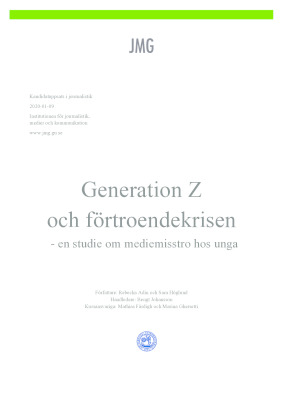Generation Z och förtroendekrisen
En studie om mediemisstro hos unga
Aim of thesis: The aim of the study is to investigate how young adolescents aged 16 to 29 argues and motivates a distrust in the traditional news media.
Theoretical framework: Institutional trust, Dunning Kruger effect, Uses and gratification, Confirmation bias.
Methods: Qualitative focus groups interviews consisting of teenagers aged 16 to 19 enrolled in high school programmes in Västerås, Sweden.
Results: The results of the study showed that a distrust in the traditional news media was motivated by a general knowledge that the media is controlled by other forces in society in contrast to the one of being an objective mirror of world events. Powers of the market, censorship and propaganda are mentioned as well as the media having their own political agenda. An awareness of one’s own inability to fully determine what is true or not also affect the level of distrust. The respondents further discuss how the consequences on trust of spreading fake news depends on the motive of the source. A few of the mentioned factors that increase the distrust towards the media are mainly exaggerated and angled news as well as having a history of spreading false news.

